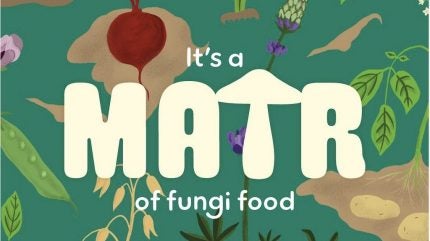
Matr Foods aims to scale volumes with a new facility within two years when the meat-alternative start-up will eye expansion beyond Denmark.
CEO Randi Wahlsten, a former Arla Foods’ executive who set up the business with three other co-founders in 2021, said Matr Foods currently operates out of a pilot factory in Denmark, producing around 30-40 tonnes of product a year.

Discover B2B Marketing That Performs
Combine business intelligence and editorial excellence to reach engaged professionals across 36 leading media platforms.
Employing a fungi-based fermentation process, Matr Foods range includes burgers and mince, mainly supplied into the out-of-home channel in Denmark, but also through online retailer Nemling. Volumes have risen by about 50-60% since the first products were turned out last year, Wahlsten told Just Food.
Last week, the company secured funding from Novo Holdings, the investment arm of the Danish non-profit organisation, the Novo Nordisk Foundation.
Wahlsten said the two parties agreed not to disclose the amount, adding that previous financing came from convertible loans, angel investors, grants and the founders, who remain majority shareholders.
“The funding is the beginning of a journey to significantly scale-up the production capacity and take it to a more industrial, automated level,” she explained.

US Tariffs are shifting - will you react or anticipate?
Don’t let policy changes catch you off guard. Stay proactive with real-time data and expert analysis.
By GlobalData“We are looking to give ourselves the ability to take a very significant step-change that is about 100 times up the volume that we’re producing right now.”
In the first phase, Matr Foods has been testing consumer appetite, which has been “well-received” by restaurants, canteen operators and retail in Denmark, with demand exceeding current production capabilities, Wahlsten said.
She added Matr Foods is aiming to realise “big volumes” in 2026 with a new facility, although plans are still in the early stages.
“It [funding] will enable us to put the blueprint completely in place and have the location ready. It will not fully enable us to build the future facility but it’s with a common understanding that that’s the next step on the journey,” Wahlsten said.
“We are very much looking at other European markets as well because we’re not building a factory to serve Denmark. The market is way too small for that.”
Quantifying the local market, she said Denmark is not the “most progressive” in meat-alternatives compared to other European countries, noting per capital spending in general is “significantly lower” than the likes of the UK, Germany and the Netherlands.
Wahlsten is confident Matr Foods is competitive on price, a key barrier not only to entry to the category but also repeat buy rates for many consumers. She said the company’s products are on par or a “little bit below” the price for “quality meat” or organic or free range.
“Longer term, when we're able to take our production up in scale, we're hoping to be able to set an even lower price point versus meat. But that remains to be seen,” she added.
At Arla Foods, Wahlsten said she was involved in the development and launch of plant-based products during her ten-year tenure at the Denmark-headquartered dairy company.
She explained that Matr Foods uses a solid-state fungal fermentation process, producing tray-based proteins with a mix of five “simple ingredients” - oats, split peas, lupins, beetroot and potatoes.
Matr Foods’ other founders include entrepreneur Claus Meyer, who set up the Meyers food group in Denmark and is also a co-founder of the Noma restaurant.
Fellow entrepreneurs Morten Sommera, who is also a professor in microbiology, and Rasmus Toft-Kehler, make up the rest of the contingent.





